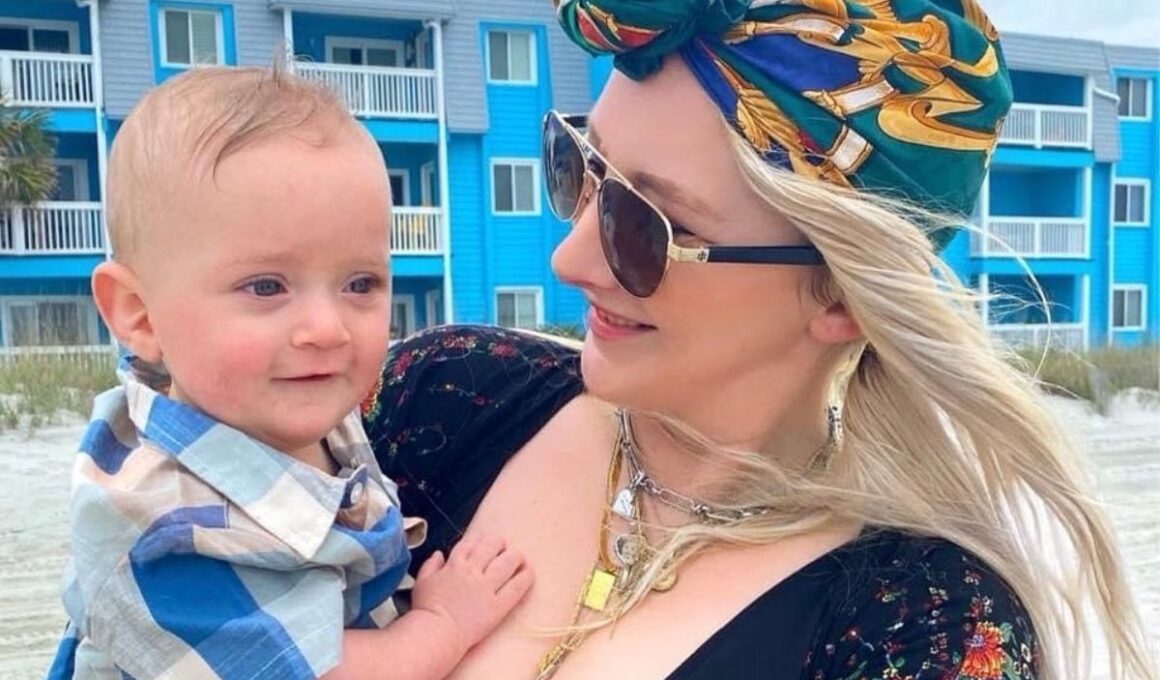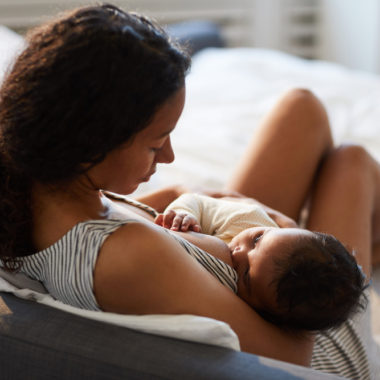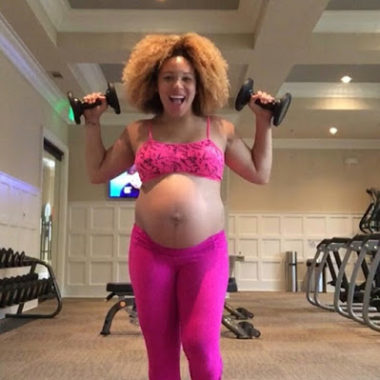In March of this year, I’ll be celebrating 7 years of recovery from drug addiction. I’m also the mother of a 2-year-old little boy named Lucien.
I had always wanted to be a mother, but my path to get there was unexpected and sometimes painful. I did not have my son until I was 32. I was divorced from another addict, who I recently learned died of a drug overdose. We had been married for five years when he told me he didn’t want to have children. After our divorce, I was single for several years before meeting my son’s father.
I found out that I was pregnant on New Year’s Day, 2021. I was at work as a veterinary nurse for an urgent care hospital when I suddenly had the urge to take a test. I knew I was pregnant; I simply needed to know for certain. I took approximately ten tests that day because I couldn’t believe it. The instant joy and excitement I had was incredible.
During this period in my life, I was undergoing Medicated Assisted Treatment for opiate addiction. My pregnancy, while a welcome surprise, was unplanned. My son’s father and I had split up shortly after we got together on a random night when he was conceived. I had started the titration process to get off my medication right before discovering I was pregnant, which I had to stop once I informed my doctor. I was terrified and knew this was going to be a unique and potentially difficult experience, but I was assured that my baby would be just fine, and I knew he would be hospitalized for a short time once he was born and made all the necessary arrangements.
I was monitored heavily by multiple doctors and specialists on a weekly basis. I had an otherwise normal pregnancy until 20 weeks when I had his first anatomy scan. This was when I realized something was wrong. There was something abnormal with his heart, but could not get the appropriate views needed to make a definitive diagnosis. I was sent to a maternal-fetal medicine specialist for a more extensive scan. This scan returned the same result, so I was transferred to a pediatric cardiologist for a fetal echocardiogram. It came back with no abnormalities, so I continued on with my pregnancy, keeping this in the back of my mind.
Around 36 weeks, I had my first non-stress test and at the beginning of the visit, my blood pressure reading was through the roof. I was taken to the maternity ward of the hospital where I would give birth and was told that I would be induced in a few short days due to gestational hypertension and would be on bed rest until then.
Fast forward to my induction day; my mother and son’s father were with me in the hospital, and I had made no progress with the Foley catheter, so 12 hours later, my doctor pushed Pitocin. I went unmedicated and vehemently declined an epidural. My water broke quickly, and my baby was born within 55 minutes.
The days that followed are still a blur. When my son was born, he was really small. They placed him on my chest, and I immediately knew something was wrong. He was blue. He wasn’t crying yet, and I noticed that he was having trouble breathing. The medical staff quickly took him from me and began working on him to manually resuscitate him. I’d never felt more helpless or terrified in my life.
I tried to keep it together because I knew if my strong exterior slipped in the slightest, I was going to crumble. I felt like the only thing I could do for my son was to stay strong for him.
During this time, a nurse practitioner came into the delivery room and briefly looked at my chart and all she saw was that I was a recovering addict and she made her decision about me: I was a junkie. With only a couple minutes gone by since I had given birth, all of a sudden I heard a sharp, loud voice talking at me: “So what’s your drug of choice?”. I stared at her with a confused look on my face, unable to tell if she was serious or if she genuinely wanted to know about my medication.
My family had the same expression on their faces and the nurse asked more aggressively, “What drugs are you on?”. I was horrified. My midwife had to discreetly mouth the words of my medication to her, trying to reassure her know that I wasn’t a junkie off the street like she was insinuating. She tried to convince her that everyone was aware of the situation, but she wouldn’t hear it.
I was so focused on my son that her presence at the time didn’t register and I brushed off her comments. My son was then taken down to the NICU, and my family followed him down there with the medical staff. I later learned that the nurse had pulled my son’s father aside and asked him if my mother was also on drugs because she “looked like she was on something too.” My mother has a number of medical conditions, including epilepsy and debilitating scoliosis; she’s technically disabled.
The first time I saw my son after he was taken to the NICU, he was hooked up to different machines and monitors, with tubes and wires attached to him. Seeing my newborn son like this was devastating.
The next day, he was diagnosed with a congenital heart condition known as Tetralogy of Fallot. This is a condition comprised of 4 defects that affect the quality of oxygen saturation in the blood that flows from the heart into the body. This created a perfect storm when his heart condition combined with his rapid birth.
Learning this news was a surreal experience. I remember the doctor talking to me, but the words sounded drowned out by the pulse pounding in my ears and the room was spinning. All I could manage to get out was to ask “Did I do anything to cause this?“. I was assured that his heart would have developed like this regardless and that I took every step possible to ensure he was safe, and had a healthy development and birth. I immediately felt a tremendous amount of guilt and shame surrounding my recovery.
The same nurse from earlier then came in and started to tell me that if I so much as stepped a toe out of line, she would make sure my son was taken from me.
When arranging his care going forward, she said condescending things to me like “I assume you’re on Medicaid?” And made comments about how she assumed I was uneducated, and unemployed, asked how I would transport him because she assumed I didn’t have a vehicle. But at the time, my sole focus was my baby. I also had the fear of her threat to weaponize Child Protective Services. This kept me from making any complaints because I knew she would retaliate.
I remember thinking that in my case, she was completely wrong about me. Every single thing she assumed about me was wrong; I am educated, I have a terrific job that provided me with health insurance and the ability to take 3 months of maternity leave. I had a large network of support in my local recovery community. I could only imagine how she treated other women who were in worse situations than me and maybe they were addicted to drugs, didn’t have jobs, needed assistance, and simply needed compassion rather than judgment.
It made me extremely angry. For a long time after my son’s birth, I couldn’t think about it without feeling a huge amount of anger. When I received my son’s diagnosis, I was going through what was possibly the worst moment of my life, and I had a nurse threaten me because of her own personal, and quite frankly, ignorant opinions. If she had taken 5 minutes to talk to me or even ask the other medical staff, she would have realized she was wrong.
My son came home after a stint in the NICU and we began his journey to repair his heart. We started seeing a cardiologist every 6 weeks. At 8 months old, he underwent a full surgical repair and had a successful open heart surgery. My son’s doctors informed me that they had never encountered a TOF case like his. This condition typically causes slow weight gain, difficulty feeding, dips in oxygen saturation, developmental delays, and so on. Some infants require surgical intervention immediately after birth, while others require temporary palliative care leading up to surgery. My son developed as normal as he could given his condition; his oxygen level stayed consistently around 99 and 100, and he gained weight normally despite being a smaller baby.
His case was presented at medical conferences to gain insight, and after all was said and done, his cardiologist came to visit him after surgery and informed me that they had no medical explanation for his ability to thrive despite his heart condition and that he truly is a miracle.
I was told that I had done an amazing job and at that moment, I felt vindicated.
I still think about that nurse and wonder why she was so judgmental and belligerent towards me and my family. It made me wonder if she had personally experienced the effects of addiction in some way, which had shaped her views. I wonder if she had become jaded and cynical over years of witnessing parents not do right by their children. However, regardless of the reason, I can never think about my son’s birth without thinking about that nurse.
I want people to understand that women in my situation aren’t morally flawed. My situation isn’t a common one; what I was told was more common was finding out after the fact that babies are born drug-addicted because the mothers never informed them about their illegal substance abuse.
In my case, my medical team was ready to have my son treated. They told me that being on prescription medication in a highly supervised program made a huge difference. By that point in my MAT program, I was allowed to have 2 weeks of take-home doses and had passed all of my drug screens with flying colors. If I had been new in the program, I would have needed to go to the clinic every day and take my dosage in front of a pharmacist.
While my pregnancy was not perfect, my son is the best thing that has ever happened to me. He truly is a miracle and I believe that he was meant to be here. If my son had not been scheduled to go into the NICU that night, his heart condition might not have been detected as accurately and quickly as it was. I truly believe everything happens for a reason, no matter how complicated and painful it may have seemed at the time.
I don’t want other women to go through what I experienced, and sadly, I am fully aware of the stigma associated with addiction and recovery all too well. It’s only through education and training that medical providers can be less judgmental towards mothers like myself. I did everything correctly, but I was still treated in a way that showed little concern for my son.
My son is now almost two and a half years old; he is happy, healthy, and brightens up the world of those who love him. We support the Children’s Heart Foundation by participating in fundraisers for research and treatment of pediatric congenital heart disorders. My life started over when my son was born and, I was only able to get there through my own journey in recovery.
– Signed, Katie.
- My Parents are terrible Grandparents part 2 - May 13, 2025
- 10 Honest Mom Confessions That Will Make You Feel Seen - January 25, 2025
- Postpartum Intimacy: Feeling Rejected and Alone - May 21, 2024








